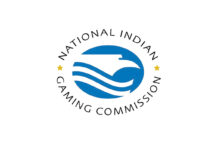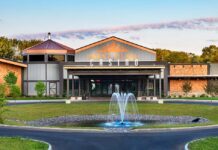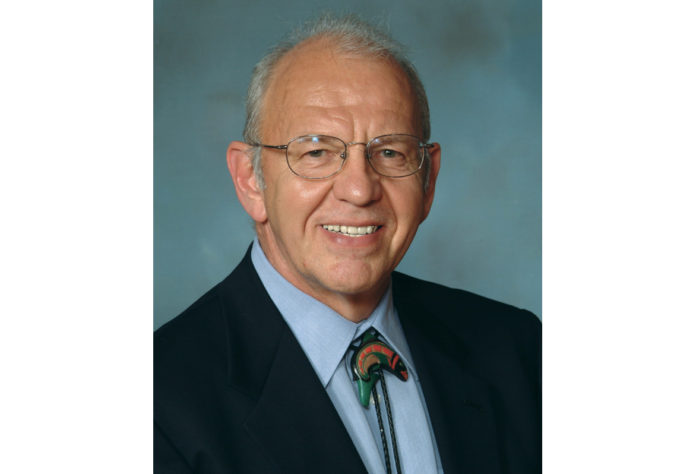W. Ron Allen, Chairman
Jamestown S’Klallam Tribe
7 Cedars Hotel & Casino in Sequim, WA
7cedars.com
jamestowntribe.org
CHALLENGES/REWARDS: The biggest challenge has been getting our labor force back on board. It’s been an issue nationwide, and we certainly are experiencing it too with lots of positions open, making it challenging for us to basically run our businesses.
We made it through the COVID-19 pandemic fairly well with the CARES Act and American Rescue Plan monies that have helped us bridge those challenges. That helped a great deal, however, the federal government seems to be a bit on half or three-quarter speed right now. Getting them to deal with their responsibilities has been rather challenging as it’s hard for us to reach them and get timely responses. A good example would be with regard to our Jamestown Healing Clinic for opioids and substance abuse. We’ve jumped through all of the hoops on all of the different state and federal certifications and licenses that we need to open up, but can’t get DOJ’s Drug Enforcement Agency to respond. We can’t open without their certification.
Another challenge has been all of the growth and development projects, which have been skyrocketing off the charts. Material costs have increased by 30-35%. On top of that, it’s hard for subcontractors to get jobs done because of a lack of workers.
What’s been great, however, has been the resilience and will of our Indian community. When COVID hit, it allowed us the opportunity to advance agendas that were on the horizon, but got quickly pushed to the forefront, such as a traditional foods program. There ended up being some challenges in terms of serving people, particularly the elders. We found that by developing an elder driven traditional foods program, there were alternative ways to provide Meals on Wheels and easier ways to reach out and serve those in need.
We also have a strong program educating the general public about the importance of environmental protection and restoration, as well as the impacts of climate change. We were able to find the resources through the state, community, and nonprofits, to build the facilities that will provide that education in the classroom, and to the many adults and tourists who come through our properties.
PROMOTING LEADERSHIP: We try to mentor as best we can as new leadership emerges. I spend a fair amount of time helping future leaders understand the complexities of intertribal, tribal-state and tribal-federal relationships, and why they are important. We are branching out more and more by sharing responsibilities to represent the tribe, which helps them get more comfortable in public forums. Meanwhile, the staff does a fabulous job of briefing these individuals on different areas of jurisdiction such as health care, education, natural resource agendas, public safety, and violence against women and children. It helps them have a better sense of the multilayered complexity of tribal relations – from local to federal.
It’s important for up and coming leaders to learn how to be patient and be understanding of other views and cultural values that are also indigenous. Additionally, it’s important to do one’s homework – to not just understand your sister tribe’s views, but also to be able to step back and truly understand how local, state, and federal governments work, and keep everything in perspective. It’s one thing to be able to challenge any level of government about issues that are important to you. It’s another to look at solutions that cross over intertribal affairs. Find common ground. We can coexist responsibly and respectfully, and you can’t necessarily get there overnight.
It’s taken hundreds of years for us to get to where we are now, but in the last 30 years, give or take, the sophistication of tribes has grown immensely. Our ability to understand thesystems that we interface with and secure the professionals that can assist tribes in advancing or advocating for our agenda has grown exponentially. We also now have more leaders with extensive education and backgrounds and greater experience in these cross-jurisdictional forums. I try to help people understand that I see our government-to-government relationship, similar to a multi-layered chess game. It’s very complex and there are overlapping moves, relationships and responsibilities. It doesn’t matter whether you’re working with a government, educational institution or association, they all have forums, and they are all trying to share their views of tribal rights, jurisdiction, and authority.
INITIATIVES: We want to move into the 21st century being more creative. We are a Northwest fishery tribe. Fisheries have been struggling – both fin fish and shellfish. Our desire is to be much more progressive. Fish farming and shellfish farming are ways of the future. Eighty percent of seafood in America is imported. We want to be in that market, and there’s no reason for us not to be. It creates opportunity for jobs and for extensive new unrestricted revenues for the tribe. That’s a cultural bridge to the traditional fishers saying, ‘We are not undermining you. All we are doing is value adding and it’s a new technique. We are more sophisticated than we were 20+ years ago.’ That is a huge opportunity where we can move our agenda forward while we protect our treaty rights and our resources.
The Biden/Harris administration has opened up better opportunities for American Indian and Alaskan Native leaders and our citizens. We are filling in more non-traditional Indian positions in the administration. It’s exciting because now there are more Indians in positions of authority and discretion that you didn’t have in the past that continue to elevate the education of decision-makers from the federal government and subsequently the state governments as well. These are really good opportunities, such as the restoring of our advisors in the White House, and making a case for an advisor at OMB and at the Department of Justice. There are now Indians that have finally been appointed to the federal court system. It helps when you penetrate into those forums, into those inner circles, to have people who are knowledgeable about Indigenous peoples, our rights and our culture as they make decisions that affect those rights. We are living in exciting times.















































